Items
Tag is exactly
psychology
-
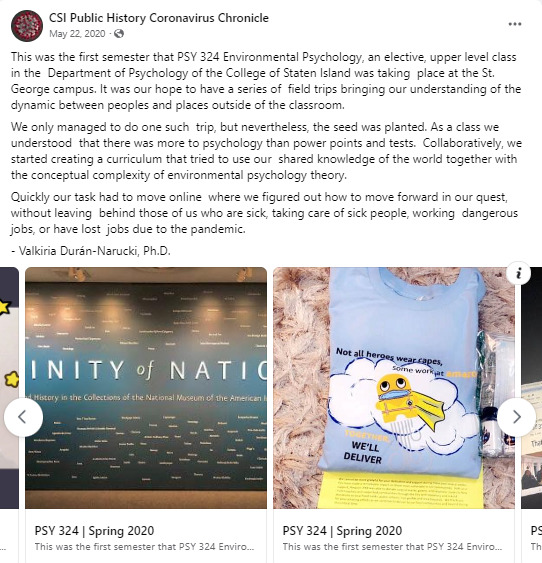 May 22nd, 2020
May 22nd, 2020Environmental Psych. First Semester!
This was the first semester that PSY 324 Environmental Psychology, an elective, upper level class in the Department of Psychology of the College of Staten Island was taking place at the St. George campus. It was our hope to have a series of field trips bringing our understanding of the dynamic between peoples and places outside of the classroom. We only managed to do one such trip, but nevertheless, the seed was planted. As a class we understood that there was more to psychology than power points and tests. Collaboratively, we started creating a curriculum that tried to use our shared knowledge of the world together with the conceptual complexity of environmental psychology theory. Quickly our task had to move online where we figured out how to move forward in our quest, without leaving behind those of us who are sick, taking care of sick people, working dangerous jobs, or have lost jobs due to the pandemic. -
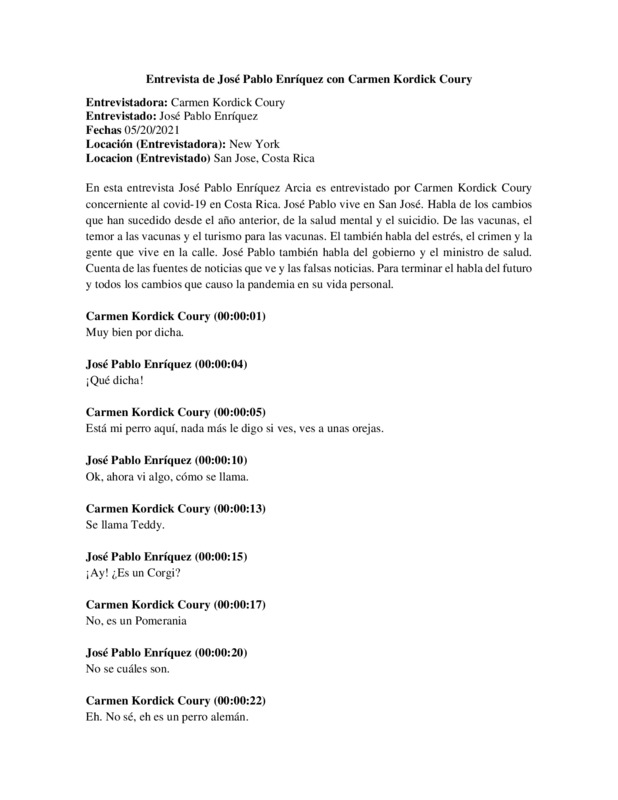 05/20/2021
05/20/2021José Pablo Enriquez Arcia Oral History, 2021/05/20
En esta entrevista José Pablo Enríquez Arcia es entrevistado por Carmen Kordick Coury concerniente al covid-19 en Costa Rica. José Pablo vive en San José. Habla de los cambios que han sucedido desde el año anterior, de la salud mental y el suicidio. De las vacunas, el temor a las vacunas y el turismo para las vacunas. El también habla del estrés, el crimen y la gente que vive en la calle. José Pablo también habla del gobierno y el ministro de salud. Cuenta de las fuentes de noticias que ve y las falsas noticias. Para terminar el habla del futuro y todos los cambios que causo la pandemia en su vida personal. -
 2021-09
2021-09Meme about covid-19 as a religion
I encountered this meme on twitter in 2021. Someone had shared it not understanding what it meant, to make fun of whom they assumed was an American Conservative who made it, and when I first saw it- it provided me with a lightbulb moment. I had not been able to understand through the pandemic why followers of God based religions were not able to take the pandemic seriously. Outside of conservative politics there was an aspect missing from the conversation about the pushback against pandemic safety measures. This meme showed me that many believers in God were unable to take the pandemic 'seriously' because to be afraid of covid-19 would be to view and interact with it like they do God. If you fear God, if your relationship to God is fear based, you cannot fear Covid-19 unless you wish to treat it in a manner similar to God. I think this simple meme is important in contextualizing the history of the pandemic, how those of God based faiths could not cope with the pandemic in a similar manner as others. The pandemic has changed me in a lot of ways, I had just turned 22 when the pandemic first started and now in December of 2022 I will turn 25 years old. Transitioning from early to mid 20's is always a challenge but the pandemic has created strange times as I transition more into adulthood. This meme has begun an interest and more mature perspective on the role religion plays not only in politics but the psychology behind people of God based faiths. This meme alone has assisted me in developing compassion for people I thought were just stupid when the pandemic started. There is no one rational response to immense fear, only personal widely varied responses; every person has a deeply individualized psychology built off of neural networks formed only by their unique experiences daily. -
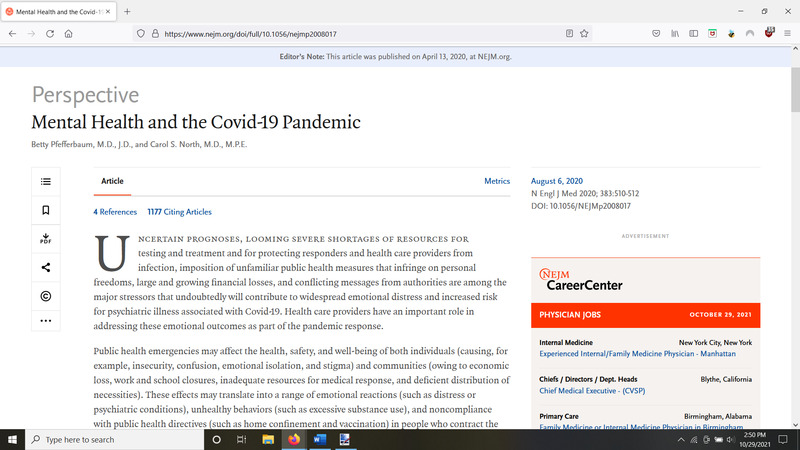 2020-04-13
2020-04-13Mental Health and the Covid-19 Pandemic
Uncertain prognoses, looming severe shortages of resources for testing and treatment and for protecting responders and health care providers from infection, imposition of unfamiliar public health measures that infringe on personal freedoms, large and growing financial losses, and conflicting messages from authorities are among the major stressors that undoubtedly will contribute to widespread emotional distress and increased risk for psychiatric illness associated with Covid-19. Health care providers have an important role in addressing these emotional outcomes as part of the pandemic response. -
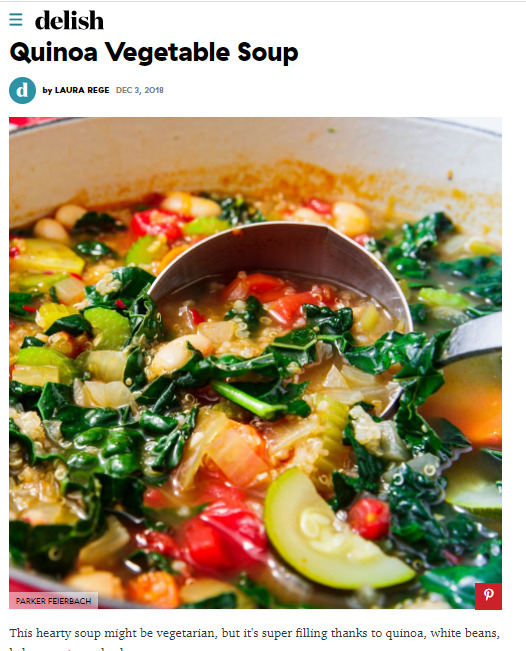 2021-08-02
2021-08-02Jared Holmberg Oral History, 2021/08/02
When the Pandemic first broke out, I was concerned that I would catch the virus since I was working in an elementary school at the time. I thought of various ways to boost my immune system and I thought making healthy soups sounded like the best idea. I looked through the internet and I found this healthy quinoa soup recipe. I tried it and absolutely loved it. It was savory, hearty, and contained a rich blend of rustic flavors. This dish became one of my favorites throughout 2020 and I still cook it from time to time. For anyone looking for a healthy way to fight the virus, I recommend this recipe. -
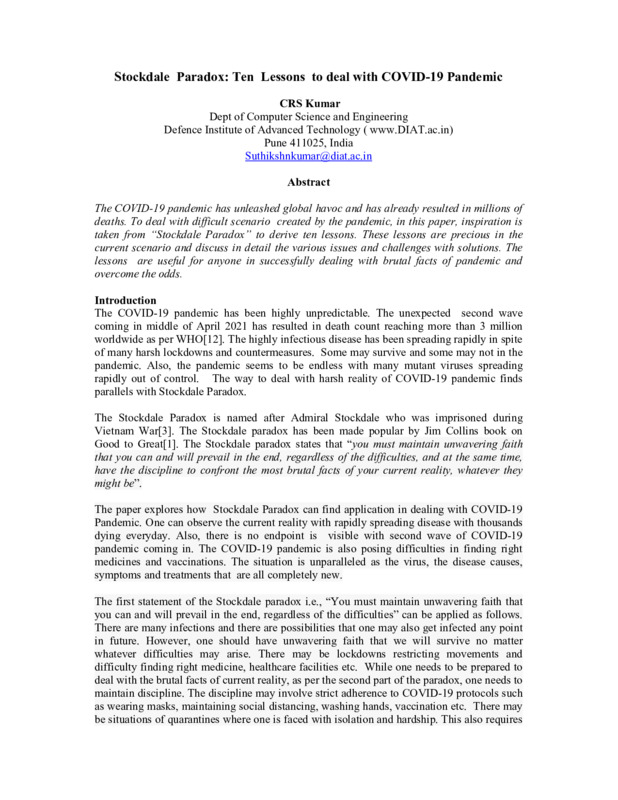 2021-05-17
2021-05-17Stockdale Paradox: Ten Lessons to deal with COVID-19 Pandemic
The COVID-19 pandemic has unleashed global havoc and has already resulted in millions of deaths. To deal with difficult scenario created by the pandemic, in this paper, inspiration is taken from “Stockdale Paradox” to derive ten lessons. These lessons are precious in the current scenario and discuss in detail the various issues and challenges with solutions. The lessons are useful for anyone in successfully dealing with brutal facts of pandemic and overcome the odds -
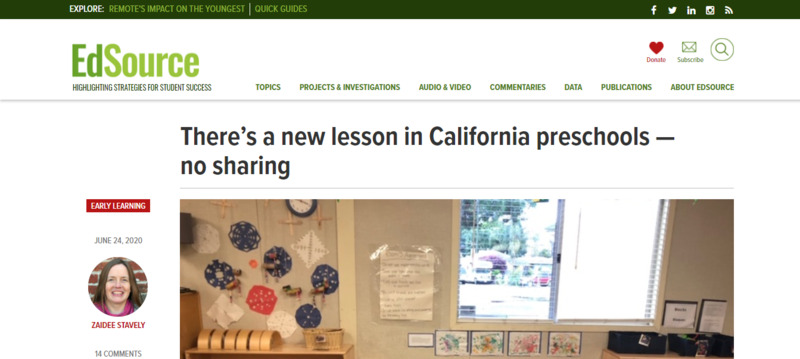 2020-06-24
2020-06-24The New Reality of California's Preschools
"Gone are family-style meals and snacks where children serve themselves. And no more sharing toys." If it sounds grim to you, it sort of is. Children are having to stay six feet away from one another just like any other person. The difference is that a lot of these children are still far too young to understand why. Safety guidelines have been provided from the California Department of Public Health, county departments of public health, and the California Department of Social Services. This is in a notable and admirable attempt to grab some semblance of normalcy back while remaining cautious. Some other changes include, but are not limited to, having toys be sanitized after use, physical touch (i.e. hugging) are kept to a minimum, and children cannot play outside (such as the playground structures). A big problem seems to be with the touch, though. A lot of these children, as young as 2 years old, start crying and need some physical comfort. Although some of these new guidelines are straightforward and simple, they're not easily implemented as it can easily hinder a child's development and understanding of the world. -
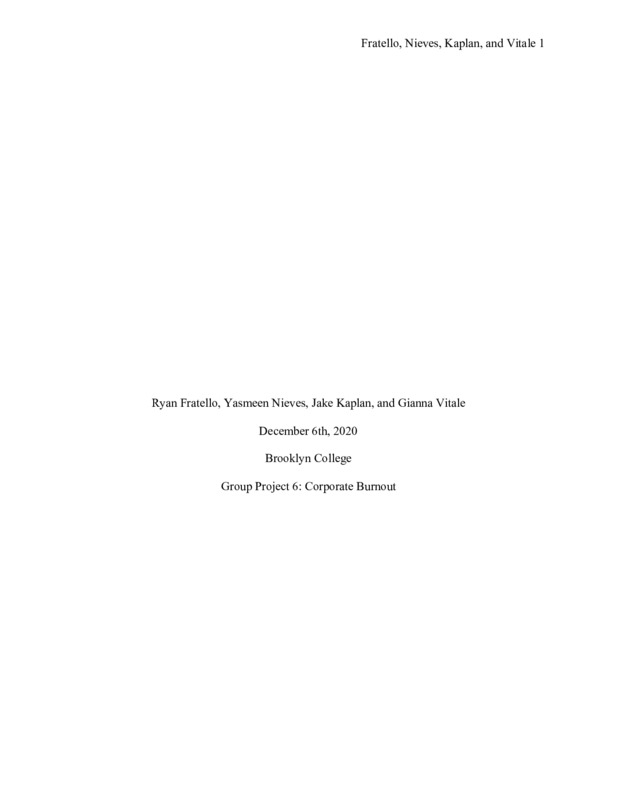 2020-12-10
2020-12-10Burnout: A Sociological Analysis of the 24/7 Work Mentality and Its Impact on the City That Never Sleeps
The item we are submitting is a reflection of society at large, something imperative as we have all been forced to self-reflect on a personal scale during this pandemic. Being forced to recharge and take a breath from the tech-fueled, on-the-go, culture we are entrenched in is a psychological challenge in and of itself. Therefore, starting a conversation as to why work is seen as a means to an end rather than as a self-fulfilling contribution to society and, consequently, something that leads to burnout is a conversation worth having before we enter into a society once again that causes severe stress and anxiety for most people. This is important because we must look at not just our personal lives, but the society we live in so that we can properly address the factors leading to major decline in the mental health of so many, as well as whether or not we want to re-commit to such a society once life returns to some sense of normalcy. -
2020-08-25
Putting a Face to the Mask
When talking to a person I've just met who is wearing their protective mask, my brain begins 'picturing' what that person looks like with their mask OFF. The area of a person's face between the base of their chin and the bridge of their nose (i.e. the "lower half") seems more defining of their appearance than what I had imagined. Masks are necessary during this pandemic, but they steal half of our face. We lose a defining aspect of who we are; what we look like. Only YOU have YOUR face. But with a mask on, I can only guess what you look like, and for some reason my brain wants to know. I am never disappointed by what a person's face turns out to look like in its entirety. I'm not concerned with actual 'quality of looks' the way my brain seems to be with "putting a face to the mask." -
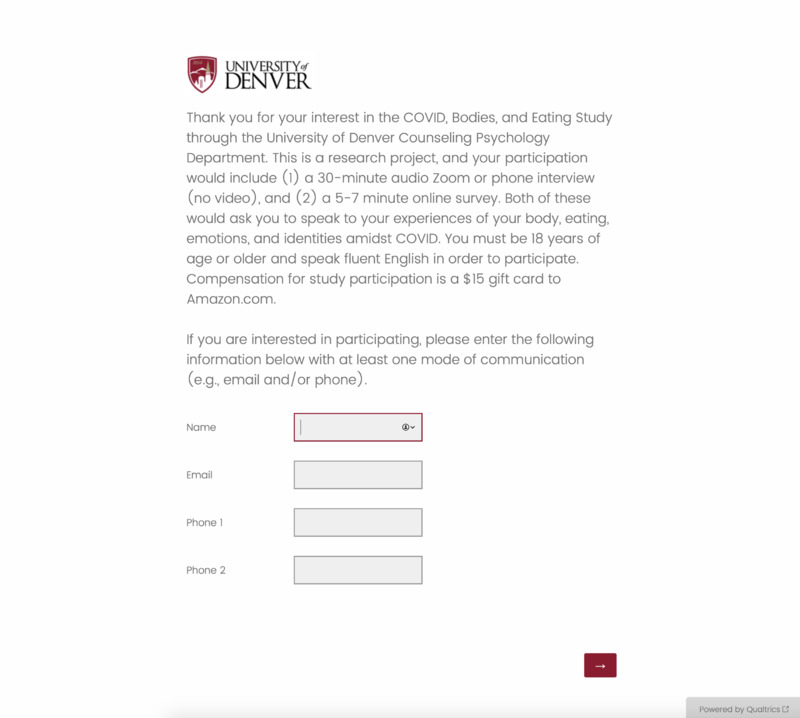 2020-08-01
2020-08-01University of Denver Researching the affects of COVID on Bodies and Eating
The University of Denver is recruiting study subjects to answer questions about the relationship between COVID-19, food habits, body issues, and emotional responses. -
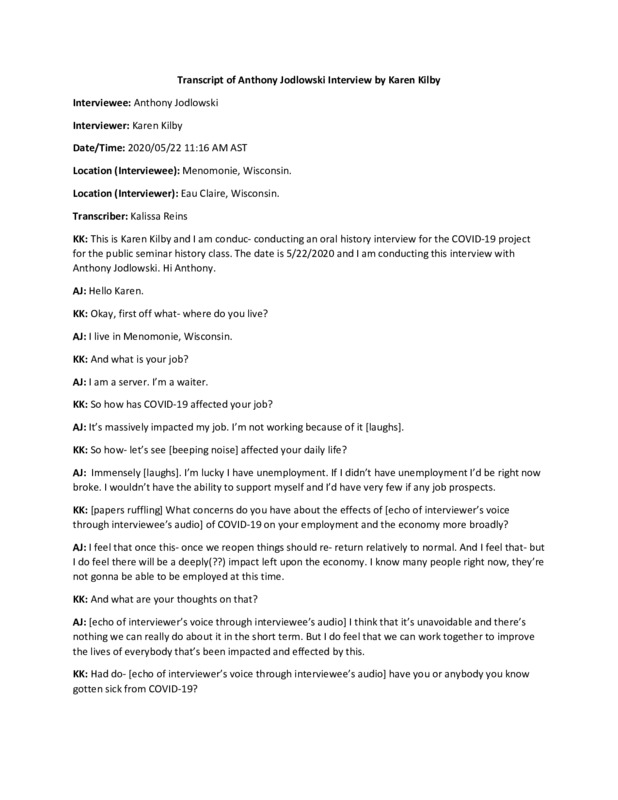 05/22/2020
05/22/2020Anthony Jodlowski Oral History, 2020/05/22
University of Wisconsin Eau Claire Public History Seminar Covid-19 Project -
 2020-05-28
2020-05-28Dreams in Quarantine
I normally don't remember my dreams, but since quarantine has started I've either been having weird dreams or have just not been sleeping well at all. After speaking with friends and family to see if they have experienced something similar, it seems to be across the board that everyone's sleep patterns have changed. In doing some research, apparently it's enough of a noticeable impact that scientists are investigating what is happening. -
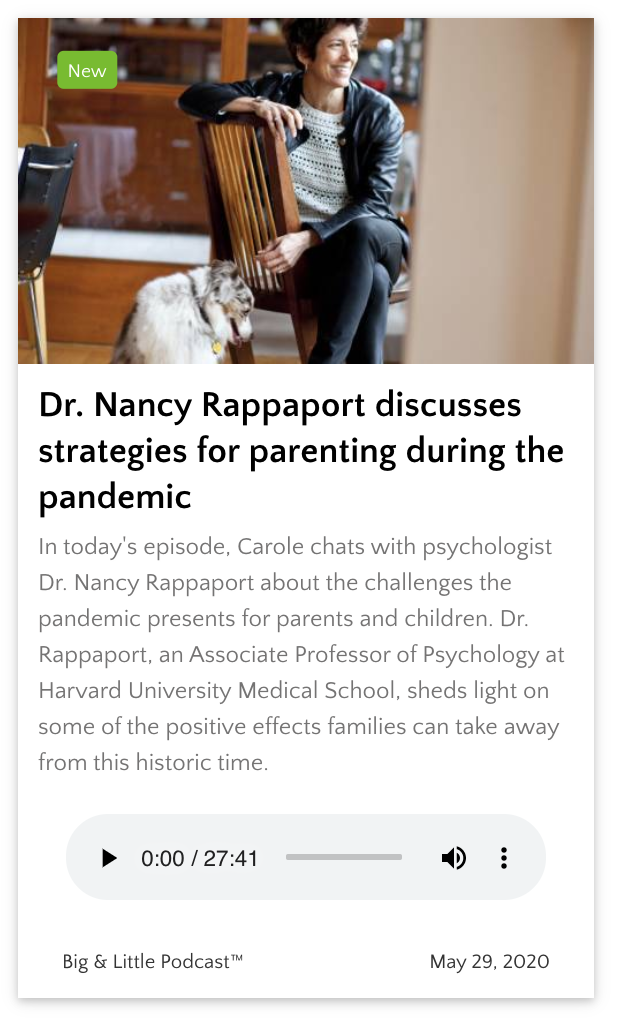 2020-05-29
2020-05-29Dr. Nancy Rappaport discusses strategies for parenting during the pandemic
This is the second episode of the Boston Children's Museum's podcast, Big & Little, podcast for adults about kids and families. In this episode, BCM CEO "Carole [Chernow] chats with psychologist Dr. Nancy Rappaport about the challenges the pandemic presents for parents and children. Dr. Rappaport, an Associate Professor of Psychology at Harvard University Medical School, sheds light on some of the positive effects families can take away from this historic time." -
 2020-03-27
2020-03-27Calm in the Time of Coronavirus
Psychology Professor Susan Orsillo offers advice for practicing mindfulness amid the unprecedented challenges posed by COVID-19, and anxiety expert David Langer, also on the Psychology faculty, has tips for families as they cope with a host of fears and responsibilities during the coronavirus pandemic. "It is natural for us to feel anxious about COVID-19, given how quickly our routines have become disrupted," says Orsillo. "Many people are struggling with significant challenges: the illness of a friend or relative, financial struggles, balancing childcare with work, loneliness, and the disappointment of canceled plans. Practicing mindfulness involves acknowledging that these stressors are real and painful and being kind to ourselves." -
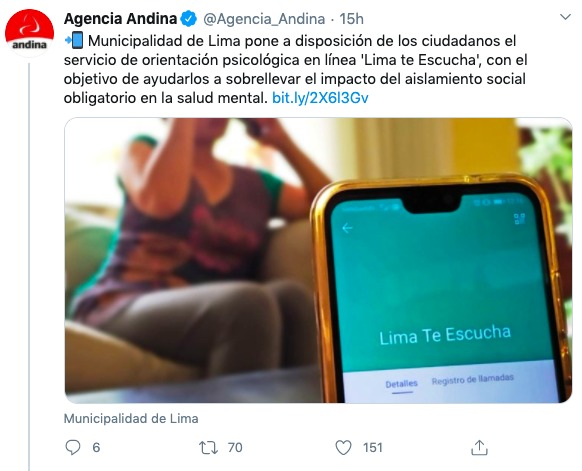 04/03/2020
04/03/2020Lima te escucha
Municipality of Lima makes a psychological service available to residents called "Lima Hears you." The Objective is to help with social isolation and mental health. -
 2020-03-09
2020-03-09The psychology behind why toilet paper, of all things, is the latest corona virus panic buy
CNNhealth
